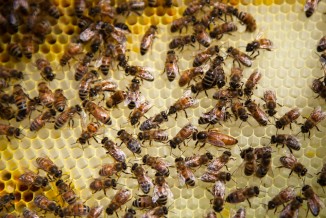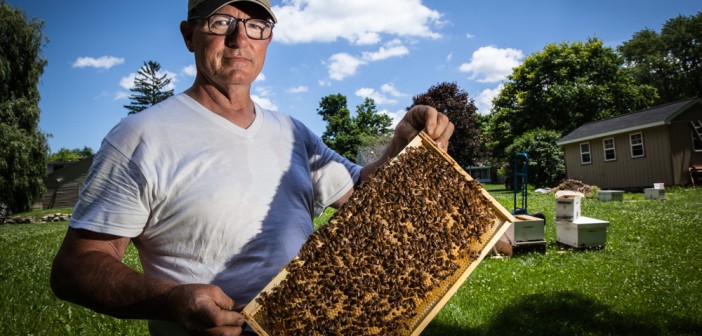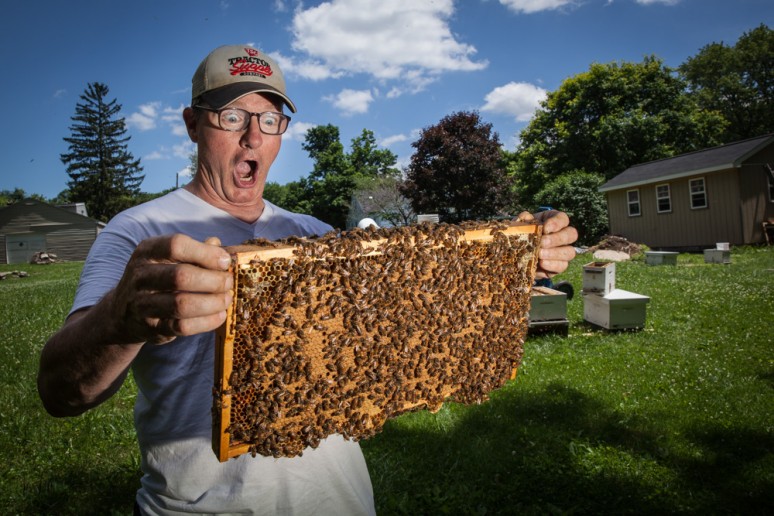 Curious about the plight of honeybees? For-Mar Nature Preserve is offering its Honeybee Kids Beekeeper Basics program Wednesday, June 17, 2015 from 12:30 to 1:30 pm to include fun games and interesting facts from local Beekeeper Jim Withers. It’s free and no pre-registration is required, although organized groups are encouraged to call ahead.
Curious about the plight of honeybees? For-Mar Nature Preserve is offering its Honeybee Kids Beekeeper Basics program Wednesday, June 17, 2015 from 12:30 to 1:30 pm to include fun games and interesting facts from local Beekeeper Jim Withers. It’s free and no pre-registration is required, although organized groups are encouraged to call ahead.
Jim Withers is passionate about educating people about honeybees and the need for more pollinators in Michigan. A Marine Corps veteran who retired from General Motors after 30 years of factory work, Jim runs the Withers Mountain Honey Farm in Flint. He became interested in bees when, years ago, he discovered the energy-boosting effects of honey-sweetened lemonade. The body can absorb honey quickly without the physical effects of a perceived sugar high or insulin spike. “Honey is the best energy replacement on the fly that there is,” Jim says.
He started working with a beekeeper and began learning about the lives of bees. “They became absolutely fascinating to me,” he recalls. Soon he had his own hives in place and became involved with the Richfield Township Bee Club, serving as its president and facilitating discussions about current topics in the beekeeping world. As his passion for honeybees grew, he began speaking at conventions and organizations in Michigan about the plight of the honeybee and the reduced numbers of all kinds of pollinators, such as Monarch butterflies. He hopes raising awareness will help people to see ways that they can make a difference in the environment by doing little things to protect bees and butterflies and to build better habitats.
Jim points to four problems with the honeybee population: pesticides, pests, pathogens and poor nutrition. Pests such as the varroa destructor mite, a parasite, have been a problem in American bee colonies since 1987 and they are becoming resistant to chemicals, Jim says. Beekeepers are trying to breed bees that are more resistant to it, and they’re also using organic treatments to manage the problem of parasites. Disease-causing pathogens are an ongoing struggle for bee populations and difficult to manage though some bees do survive these pathogens.
Poor nutrition due to agricultural changes and loss of habitats is an increasing problem for bee colonies. “That is something we all can do something about,” Jim says. “Farms used to have hedgerows between crops that had a lot of wildflowers.” Those hedgerows have been replaced with vast acres of bean and corn fields across the state, severely limiting the wildflower population and resulting in reduced numbers of bees. “Homeowners insist on having golf course lawns and they kill the weeds and dandelions with chemicals,” Jim says. “What’s wrong with having clover or dandelions in your yard?”
Even if you’re not keen on dandelions, providing bees with a better variety of nutrients is easy to do by simply planting a wildflower patch for them. He would also like to see the state and Federal governments do more proactively to provide better nutrition for pollinators, such as including a wildflower patch in their landscaping with a plaque stating that this patch was placed there to support the honeybee population.
Jim has fun teaching kids at For-Mar’s Honeybee Kids program and interacting with folks who want to know more about the plight of honeybees and how they can help support bee colonies and other pollinators in our state. The program is geared for all ages. “I get to talk to young minds about important things we don’t pay much attention to,” he says.
Photography by Mike Naddeo









